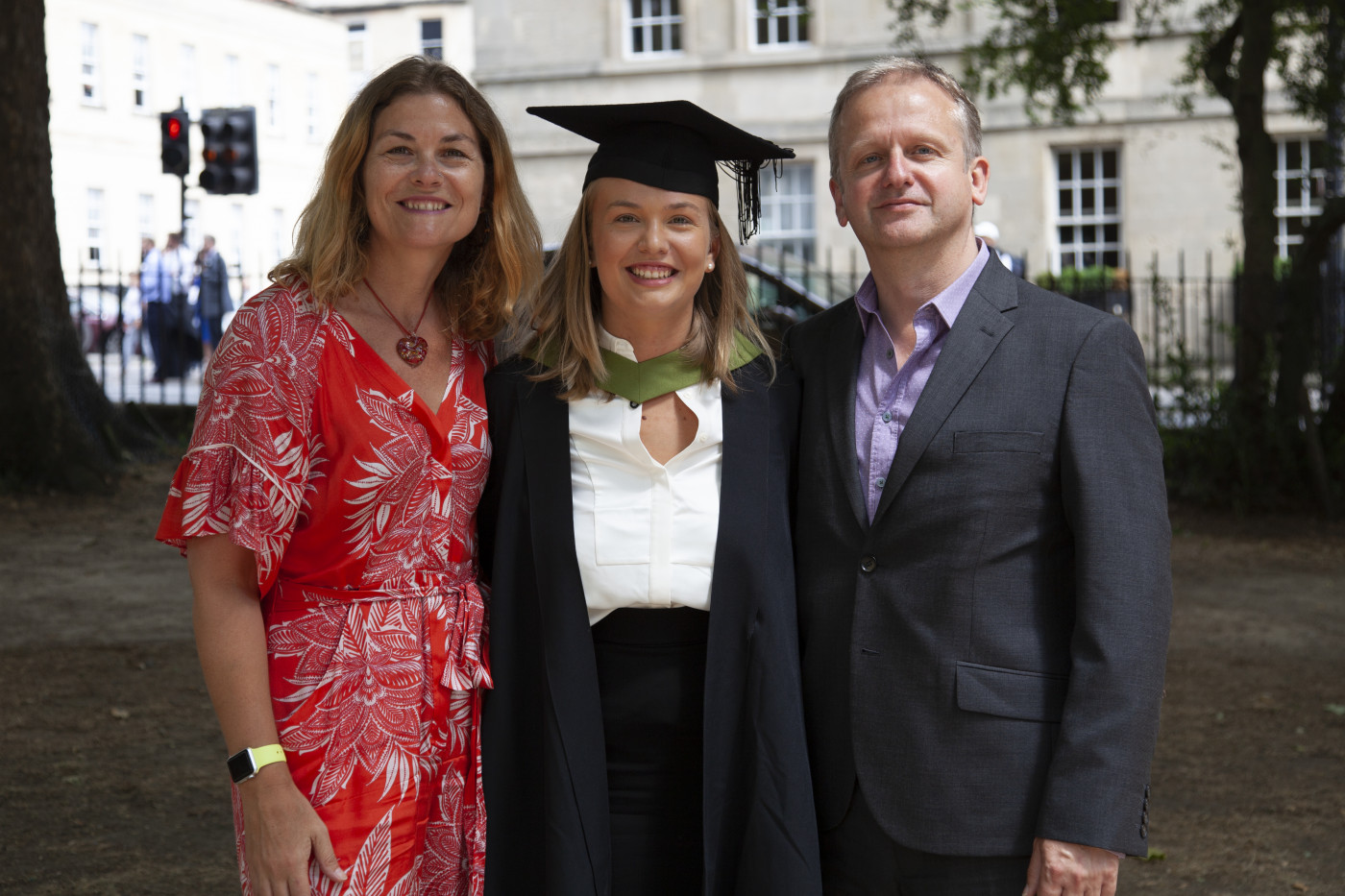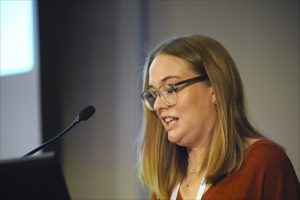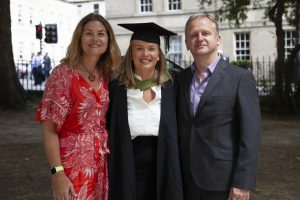Britain’s Madeline Collin Strives to be Voice of Hope for Other Gaucher Disease Patients

Madeline Collin, who has Gaucher disease, with her parents on the day of her graduation from England's University of Bath. (Photo courtesy Madeline Collin)
Discouraged by doctors. Ridiculed by classmates. Challenged on the homefront. Despite the physical and emotional trauma endured by Madeline Collin — who has Gaucher disease — this cheerful 24-year-old says her ambition in life is “to be a voice of hope and encouragement.”
The British university student talked about her struggles earlier this month at the 2nd International Congress on Advanced Treatments in Rare Diseases in Vienna.
“When I was asked to give this talk, I thought of three things which highlight the challenge of rare disease and cause problems on a daily basis: mental health, challenges in the diagnostic journey, and living with an uncertain future,” she said. “Even in this day and age, when technology is so advanced, rare-disease patients still feel isolated and marginalized.”
Collin first landed in the hospital at 17 months old after a sore throat and ear infection wouldn’t go away. Initially diagnosed with leukemia, she was eventually transferred to the oncology department at London’s Great Ormond Street Hospital.
“It was there that an exam of my abdomen revealed that my spleen had reached an alarming size,” she said. “This was distressing for my parents, who, like so many other people, had never heard of Gaucher.”
By the time Collin was discharged three months later, her father had left the family. Her mother, Tanya Collin-Histed, was forced to support the family, eventually becoming a patient activist. She is today CEO of the 48-nation International Gaucher Alliance.
“Being a small child at the time, I never really understood what was happening to me. All I knew is that I hated treatments. I remember screaming a lot,” Collin said. “My mom had to work to support us, and manage my treatment on her own. I’m not ashamed to admit that even now, I’m struggling with a huge amount of anxiety.”
Struggling through adolescence
Collin is one of 30 or so people in Great Britain with Gaucher type 3, which — like the more severe type 2 subset — is generally a disease of infancy and childhood that affects the brain and spinal cord. She serves as a director on the board of the UK Gauchers Association, where everyone else is either a type 1 patient, or a caregiver.
Type 1 is the most common form of Gaucher, and has varying degrees of symptoms. Gaucher affects about one in 60,000 people, and is particularly common among Jews of Ashkenazi, or European, descent — although Gaucher patients can be found all over the world, including in India, Pakistan, Japan, and Latin America.
Treatment generally consists of enzyme replacement therapy — which costs about $200,000 a year — and patients with Gaucher are more likely to develop Parkinson’s disease later in life.
“My peers didn’t understand why I needed one-on-one support — especially because it didn’t look like there was anything wrong with me,” Collin said, noting her increased risk of falling, even during grade school. “My classmates thought I was merely stupid, and therefore often left me out and called me names, many of which still resonate with me today.”
By the time Collin was in high school, her self-esteem had improved — yet her home life was in tatters.
“By this point, Mom and Dad had both remarried, and going to both homes was hard,” she said. “I pretended there was nothing wrong. I became severely depressed. To cut a long story short, this led to me losing contact with my father.”
At 16, Collin tried to commit suicide — a time she called “the darkest period of my life.” She eventually moved in with an aunt in Manchester and continued her studies there.
Living for the ‘here and now’
“When I was diagnosed, my parents were told I would never achieve anything of distinction, and that I would pass away at a young age. Had I not been misdiagnosed, I might have waited a lot longer to be treated,” she told delegates at the Vienna conference. “It must be said that not all rare-disease patients are this lucky.”
Collin is currently studying for her master’s degree in international development at the University of Bath, after earning a bachelor’s degree in social science and environmental studies last summer.
For her dissertation, she chose a topic she knows well: the impact of Brexit on rare-disease patients in the U.K. At her graduation ceremony, her parents saw each other for the first time in years. Collin has since reconciled with her father and says she has a good relationship with him now.
As for her prognosis, the young woman is matter-of-fact. She’s not ashamed to tell people she takes antidepressants because, as she says, “there are some things talking won’t help with.”
Collin concluded her presentation with an appeal for more understanding of people with Gaucher disease — and a suggestion not to take life for granted.
“My treatment is home-managed, and my condition has a minimal effect on my life,” she said. “The only noticeable signs of my disease are the tremor I’ve developed in my left hand, occasional balance issues, and chronic fatigue. But it could be a lot worse.”
“As I get older, there are new challenges, especially when it comes to forming relationships,” she added. “It takes an awful lot of courage to tell someone about your condition. But I have finally learned to live for the here and now.”






